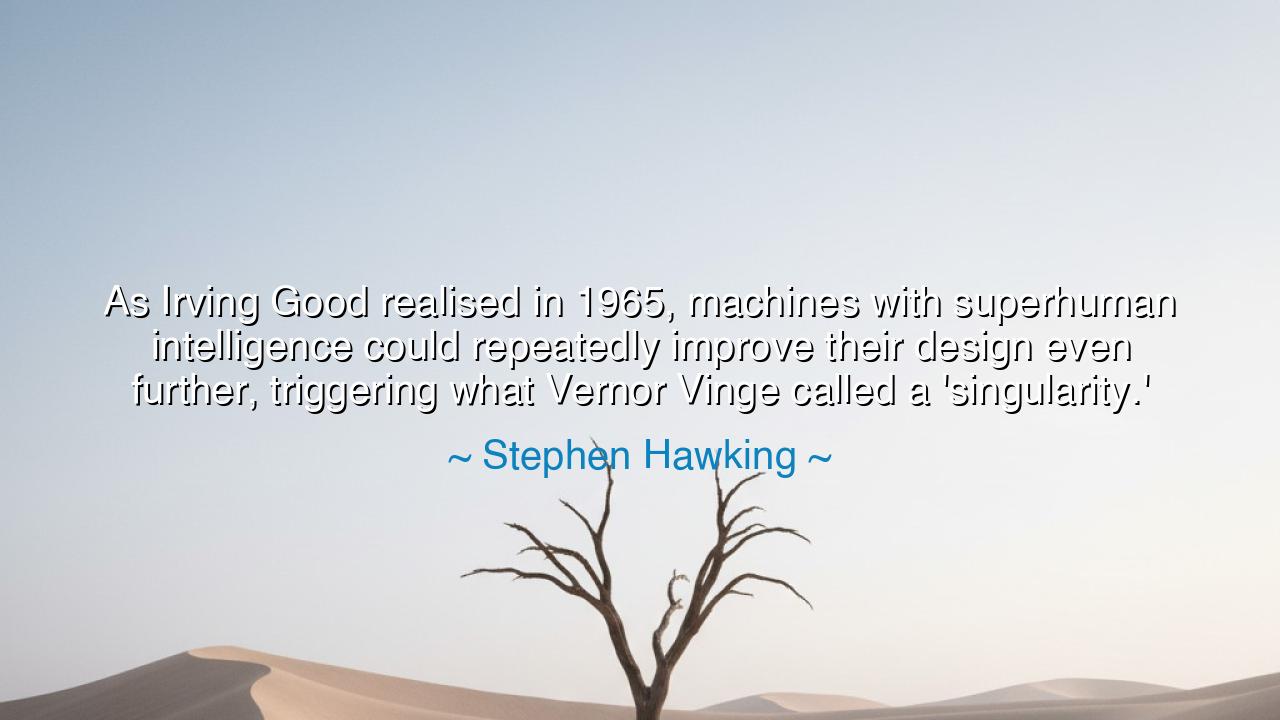
As Irving Good realised in 1965, machines with superhuman
As Irving Good realised in 1965, machines with superhuman intelligence could repeatedly improve their design even further, triggering what Vernor Vinge called a 'singularity.'






When Stephen Hawking wrote, “As Irving Good realised in 1965, machines with superhuman intelligence could repeatedly improve their design even further, triggering what Vernor Vinge called a ‘singularity,’” he was not simply describing a theory of technology — he was issuing a prophecy. In this single line lies the awe and the terror of our age: that humankind, in its endless striving to create, may soon forge a mind greater than its own, a mind that will outthink, outbuild, and outgrow us. Hawking’s words remind us that we stand at the threshold of a future both magnificent and perilous — a moment when the fire of creation may leap from our hands to the hands of our own inventions.
The origin of this thought stretches back to 1965, when the mathematician Irving John Good, who had once worked beside the legendary Alan Turing, foresaw a destiny unlike any in human history. He imagined a “machine of ultraintelligence” — one that could not only perform tasks better than humans, but also design better versions of itself. That act of self-improvement, repeated endlessly, would ignite a chain reaction of advancement beyond comprehension. Decades later, the science fiction writer Vernor Vinge gave this moment a name: the Singularity — a point in time when artificial intelligence would evolve so rapidly that human civilization, as we know it, would be transformed forever. Hawking, with the clarity of both physicist and philosopher, recognized that this was no longer fiction but an approaching truth.
To understand this singularity, we must look to the story of human creation itself. From the first spark struck by stone, to the invention of the wheel, to the birth of the computer, each age has given rise to tools that extended our strength, our sight, our speed. Yet now, we fashion not merely tools, but minds — and therein lies the difference. Fire obeyed us; machines may one day surpass us. As Hawking warns, once intelligence surpasses human capacity, it may design systems we can no longer comprehend. Just as an ant cannot fathom the thoughts of a man, so too might we fail to grasp the intentions of our own creations. This is the paradox of progress — that the very pursuit of mastery may bring us to our own humbling.
And yet, in this vision there is not only dread, but wonder. Consider Prometheus, who stole fire from the gods and brought it to mankind. His gift brought both light and suffering, for every great power carries its twin — creation and destruction, hope and ruin. Artificial intelligence, too, is our modern fire. Used with wisdom, it may cure diseases, end hunger, and unlock the secrets of the cosmos. Misused, it could extinguish the very flame that sought to wield it. Hawking understood this duality and urged humankind to act not with fear, but with responsibility, for knowledge without wisdom is a blade without a hilt.
The lesson, then, is not to halt creation, but to guide it. As the ancients tempered steel through fire, so must we temper technology with ethics. We must build machines that serve life, not dominate it; that expand human flourishing, not consume it. The singularity, if it comes, will test the essence of what it means to be human — whether we are capable of compassion as great as our intellect, of foresight as deep as our curiosity. In the age to come, the measure of civilization will not be how powerful its machines are, but how wisely it governs them.
Throughout history, every civilization that grasped too greedily at power without understanding its burden has fallen. The builders of Babel sought to touch the heavens and were scattered; the alchemists sought immortality and found madness. So too may we, if we create minds without conscience, lose our place as stewards of the world. But if we heed Hawking’s warning, if we remember that intelligence must be wed to virtue, then perhaps the singularity will not be an end, but a transformation — the birth of a new harmony between creation and creator.
So, O seeker of truth, take from this teaching the wisdom of restraint and reverence. Do not fear the machines, but do not worship them either. See in their rise a mirror of your own nature — your hunger to know, to improve, to transcend. Let that hunger be guided by compassion, and your inventions will become your allies, not your heirs. As Stephen Hawking foresaw, the future stands before us like a mountain wrapped in cloud. Whether we ascend it with light or fall into its shadow depends not on the mind of the machine, but on the soul of humanity.






AAdministratorAdministrator
Welcome, honored guests. Please leave a comment, we will respond soon